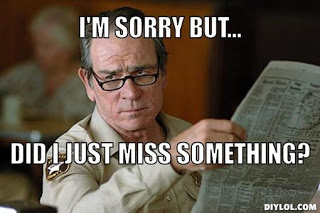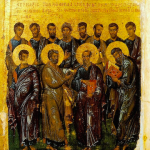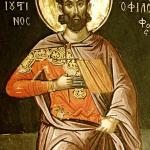Yes, it can happen. I freely admit that, using some strange and incompressible logic, a Catholic in good faith could support Sanders and still be a Catholic in good faith. Where we struggle with our pilgrimage in a fallen world, anything can happen. In an election, in a secular nation, forced to choose between flawed people, choosing the lesser of two evils can be a valid choice. Assuming, of course, that it is the lesser of two evils.
But I noticed something. Over at National Catholic Register, Mark Shea steps forward and gives a name to this rule. For years, Mark joined other Catholics on the Internet who strongly suggested that voting was inherently dangerous to one’s soul. At least voting in a national election. Especially voting in the presidential races. While he never came out and said it was impossible, the overwhelming focus of his writings was on calling people to the higher way, rather than holding your nose and choosing the lesser of two evils.
Witness this piece from 2011. There is little difference between it and the one over at the Register this month. But there is one glaring difference. Mark tends to do a Jekyll and Hyde in his ministry. In the world of Catholic talks and Catholic publications, Mark can come off as a kindly, knowing and wise teacher who understands our struggles and lovingly tries to help guide us along the narrow way.
In the world of Social Media, however, Mr. Hyde takes over and it’s a bizarre Catholic version of Jack Chick without the charm. Stereotypes, laughably dismissible logic, false accusations, demonstrably flawed premises all dominate. And any who call him out are subject to almost slanderous attacks, tribalist memes, and accusations of not trusting in Jesus or listening to the Church. In that second context, Mark never gave ground on the issue of ‘voting for the lesser evil.’ Every time it was brought up – unless it was brought up by a personal friend of Mark’s – it was smacked down. It was called out as selling one’s soul for partisan tribalism. It was outright condemned. If Mark advocated for a politician, like Ron Paul, it was because Mark was clear that the individual in no way supported that which was evil. Those who in any way tried to hold out for the lesser of two evils were taken to the verbal woodshed.
Yes, in his Catholic Publications persona, Mark conceded that it could be done. After all, the Bishops make it clear that it can be done. But Mark was careful never to condone it in a specific case, and he always stepped forward and pointed to the higher way as the preferred alternative.
And yet now, in 2016, Mark breaks that trend. While still insisting he will remain forever and happily in the bleachers rather than join a team and help it win, Mark acknowledges that one can, in fact, choose the lesser of the two evils in good faith. Which he acknowledged before. But this time, he puts a name to the choice when he gives it a thumbs up, and that name is Bernie Sanders. Bernie Sanders, a man who doesn’t simply and humbly support one or two intrinsic evils, but one who has made it his career to push zealously the boundaries for multiple sins that cry out to heaven for vengeance, as well as ending this laughable notion that all peoples and religions can be excused from bowing before the secular Left.
I just found it odd. After so many years of the barks and yells about the higher way, when Mark finally chose to be specific about that glaring exception he only hinted at in the past, he did it for a man who exemplifies everything that conservative and traditional believers loathe – and fear – from the emergent Left. And Mark does so by saying that apart from the single sin mentioned (abortion) in his piece, Bernie’s policies and ideas are for the greater good, which then cover the multitude of other policy sins.
Take it for what it’s worth. Before I stopped going to Mark’s Facebook page, he still said he’s a conservative at heart. Exactly how that works in this context, I can’t begin to say. I must have missed something. But it makes me worry that such an influential voice in Catholic lay ministries could do such a thing, and how many Catholics will, by extension, follow thorough with the approach.
















